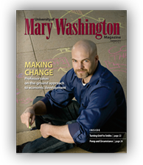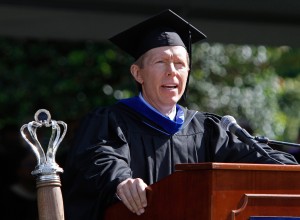Historian Neil Howe has spoken and written extensively on the collective personalities of today’s generations. With co-author William Strauss, Howe coined the term “Millennial Generation” and wrote the best-selling Generations, 13th Gen, The Fourth Turning, and Millennials Rising. Howe’s articles have appeared in such national publications as The Atlantic, The Washington Post, and The New York Times. What follows are excerpts from his address to UMW graduates at the May 12 Commencement Ceremony.
A generation is a group of people who share a basic outlook on life shaped by their common age location in history, their common “generational setting.”
Youth, on the other hand, is just an age bracket. It’s like an empty hotel room that different generations move into – with their own baggage – and then soon leave. Sometimes that room swells with sweet music, sometimes it throbs with death metal, sometimes it’s utterly silent. But it’s never the same.
Bottom line: All of you Boomer and Generation X parents are essentially unlike your children – and were not the same even when you were kids. And you Millennial Generation graduates are essentially unlike your parents – and will not become like them as you grow older. Consider.
You Millennials grew up in an era of rising parental protection – never having known a time without bicycle helmets, electric plug covers, Amber Alerts, and 15 different ways to be buckled into your minivan seat. We, the parents, grew up in an era of declining parental protection.
You Millennials were raised to be special and trust your counselors, support groups, and smart drugs to keep you feeling pretty good about the world. We, the parents, knew we weren’t very special, didn’t trust anyone to advise us, and thought staying away from counselors was a sign of toughness. When you came to college, there were long orientations and immersions – many of your parents clutched teddy bears and wept. When we came to college, we jumped out of the car and tried to grab our suitcases before our parents sped off.
You Millennials were raised to be team players, which you are, with community service, group projects in the classroom, and clubs for everything. And, above all, with digital technology that connects you all to each other on Facebook and the smart phones that you go to bed with. We, the parents, were a lot more into competition, rebellion, and defying the mainstream. Growing up, our biggest fear was that Big Brother might someday install cameras in our rooms. And now our biggest surprise is to see our own kids connect with each other by installing their own cameras in their own rooms!
You Millennials have a surprisingly conventional outlook on life. Surveys show that as you grow older you wish to become good citizens, good neighbors, well-rounded people who start families.
People ask, “What does it mean that one generation is different from another – that Millennials, for example, are different from the Boomers or Gen-Xers who raised them? Does it mean that some generations are better than others?”
There is no such thing as a good or bad generation. Every generation is what it has to be given the environment it encounters. History shows that whatever collective personality that generation brings with it is usually what society needs at the time. As such, youth generations tend to correct for excesses of the midlife generations in power, and they tend to refill the social role being vacated by the elder generation that is disappearing.
The Millennial Generation is correcting for the excesses of Boomers and Gen-Xers who today run America. Excesses like leadership gridlock, refusal to compromise, rampant individualism, the tearing down of traditions, scorched- earth culture wars, and a pathological distrust of all institutions.
The Millennial Generation is also reprising many of the hallmarks of the original G.I. Generation, the “greatest generation,” who are passing away. Like the Millennials, the G.I.s grew up as protected children and quickly turned into optimistic, consensus-minded team players who saved our nation in the dark days of the 1930s and ’40s.
So parents out there, be proud of this new generation. They aren’t like you, but they are what America now needs. They don’t complain about the dark storm clouds looming over their fiscal, economic, and geopolitical future; they try to stay positive. They don’t want to bring the system down; they’re doing what they can to make it work again. They worry about you a lot, and they want to come together and build something big and lasting, something that will win your praise. Beneath their tolerant, optimistic, networking, and risk-averse exterior lie attitudes and habits that may prove vital for our country’s healing and for our country’s future.
No one knows what challenges this Millennial Generation may eventually be asked to bear, and hardly anyone expects them to become America’s next “greatest generation.” But someday you can say you heard it from me: That is their destiny, to rescue this country from the mess to which we, the older generations, have contributed – perhaps a bit more than we ever intended – to become a great generation.

